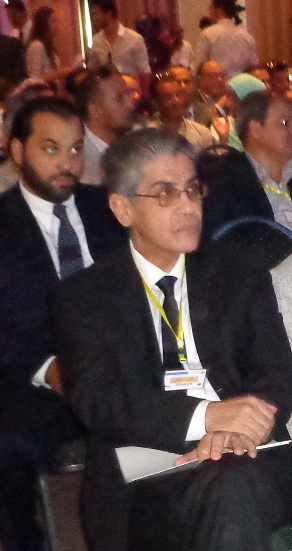By Houda Mzioudet.

Tunis, 7 September, 2015:
The restructuring of the security system in Libya must be the main priority of the future . . .[restrict]Government of National Accord (GNA) in Libya, former interior minister Ashour Shuwail has told the Libya Herald. He had been attending the National Forum for Dialogue Development, which took place over the weekend in Hotel Paris in Tunis.
At the forum, key Libyan political figures had agreed that security was Libya’s biggest challenge, in particular the increasing threat from the Islamic State (IS). There were, however, differing views as to how it had to be addressed. Many also said security had not been adequately covered in all the political dialogue.
Giving a grim account of the security situation and its impact on the long-term stability of the country as well as the region, Shuwail stressed that military and security organisations had to be de-politicised. Unlike many speakers, however, who believed that security could be re-established through national reconciliation, Shuwail took a much tougher approach.
Certain groups had been involved in the militias’ politicisation and wanted to obstruct the process of building a strong state security apparatus, he said. They were using such militias to protect themselves. Other armed groups were in it for their one self-interest, he added.
Even if a government of national accord were produce by the Libya Dialogue, it was still unclear whether it would be able to go to Tripoli and operate there, Shuwail noted. “We can have a government but can it work?” he asked.
For there to be stable government in the capital, all the militias had to pull out, he said, adding: “All heavy weapons have to be put into storage under UN control.” If the militias were not removed, their presence would “be very dangerous for Libya – and for Europe and neighbouring countries,” he stated.
Should they refuse to go, they would have to be forced out, he insisted.
The situation in Benghazi where ideologically-motivated fighters were operating required a very different solution, he stated. Most of it had been liberated, he said, but for the remainder, around five percent of the city, military units trained in house-to-house fighting were needed. A solution, he suggested, would be a force, authorised by the UN, consisting of troops from Arab and Muslim states.
There would, nonetheless, be “very good news” about Benghazi soon, he added, refusing to explain further.
Shuwail’s position was echoed by Amal Al-Obeidi, a University of Benghazi professor and security analyst.
“Armed groups had been established on tribal, regional and ideological lines,” she explained, and they had to be dismantled and included in the Libyan security apparatus as a first step towards rebuilding new institutions.
She too believed there also had to be international assistance in removing weapons, under a UN supervision.
She called for representatives of all the armed factions to be included the Libya Dialogue, reiterating the view that security needed greater attention so that a GNA can succeed. [/restrict]










